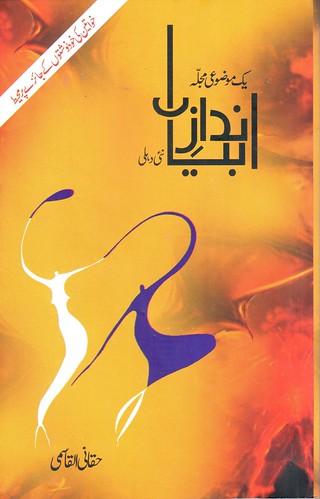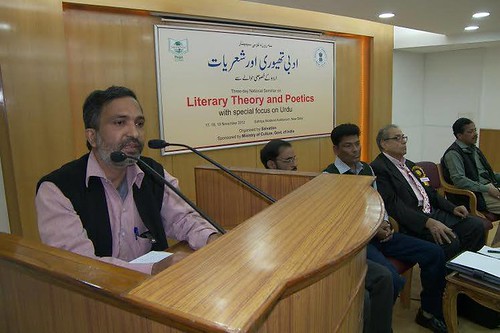
By Manzar Imam for TwoCircles.net,
Subjugated for centuries, women have come a long way to getting their voice heard even in the most so-called progressive societies. These suppressions have led to the emergence of global women’s rights movements. Alike other parts of the world, the Indian subcontinent too, of late, has witnessed a surge in the feminist writings and debates. However, more needs to be done to let the half of humanity to have its justifiable place in society.
Andaz-e-Bayan-1, May-July 2016
Editor: Haqqani Al-Qasmi, Arshia Publications, New Delhi
295 Pages, RS 300, E-mail to avail: [email protected]
Eminent Urdu litterateur Haqqani Al-Qasmi’s inaugural issue of the Book Series of Andaz-e-Bayan can be termed as a positive effort to bring to fore diverse issues of women; especially of women from marginalized sections of society. The virgin issue of the single-subject literary journal dedicated to analytical evaluation of women’s problems of abuse, betrayal, displacement, divorce, loneliness, separation, widowhood, etc in the light of their biographies is a valuable addition to the existing feminist literature about marriage, love, life, liberty, pain and sufferings across the globe.
Although it contains biographical analysis mostly of women writers from India and Pakistan, it also has references of women writers from West Asia besides references from Western feminist writers who have been facing more or less similar kind of challenges in a male-dominated literary discourse.

Haqqani Al-Qasmi during a Sahitya Academy seminar
Most patriarchal Asian societies have long devalued or undervalued women’s participation in one of the key components of development: education. While there is too much talk about building ‘knowledge societies’ across the world, women still figure among the least visible partners in this development discourse.
The history of origin and the varied views whether or not to place biographies in the genre of literature and where to mention it is also discussed. Ishrat Zafar’s review of Sajida Zaidi’s autobiography is wonderful, whereas Abrar Ahmad Ijravi’s review of women’s biographies in Arabic is informative. Shahidur Rahman’s review of Kusum Ansal’s biography is thought-provoking while Faiyaz Ahmad Wajeeh’s Anatomy of My Story does justice to Kamala Das, whose writings had even earned her the misnomer of nymphomaniac.
Andaz includes analysis of biographies of Urdu, Punjabi, Marathi, Hindi, Kashmiri, Arabic and other writers. Jannat se Nikali Huwi Hawwa (The Exiled Eve of Paradise), an autobiography of Nafees Bano Shama narrates a woman’s plight in these words:
Dressed in the best kind of the modern attire, with make-up, necklace of a precious-stone, rings outnumbering the fingers, long dangling pendants were indicative of her happiness. One wonders how gracefully a woman had concealed her sorrows under diamonds and jewelries. People would call her lively, smiling and chirpy. She had mastered the art of pleasing and flirting people on every occasion, making the grieved faces smile. She looked picture perfect, full of life. But only she knew how to conceal tears every moment and suffer in silence.
“Spread here and there”, writes Haqqani, “There are many such stories with aspects of pain and agony which are absent from eyes. Andaz-e-Bayan is dedicated to them.”
His ideas find resonance in the two biographies of Zahra Daudi which Razia Hamid explores. Like many men, Zahra was a staunch nationalist who had never thought of migrating to Pakistan. She would even oppose her classmates who justified the two-nation theory, as a result of which she discontinued talking to them. Yet, she could not resist her husband’s decision to migrate to Pakistan. She, however, continued visiting India and considered Patna her real home where her heart lay. “I don’t know what attraction was there in a [then] small city and word Patna which I could never forget.”
The stories of loss and gain steeped in pathos abound as revealed by Shabana Saleem who revisits the lives of four prominent women from different spectra: Wazir Sultan Begum, Nawab Sultan Jahan Begum, Shaista Suhrawardy Ikramullah and Bimla Das. Sultan Jahan Begum, the famous begum of Bhopal who became Chancellor of Aligarh Muslim University and contributed hugely to the University’s expansion in terms of donations as well as ideas. She did not like the traditional purdah but also did not follow the West. A big admirer of India’s diversity of traditions, she expressed great happiness over the opening of the Department of Sanskrit at AMU.
Suhrawardy’s autobiography From Purdah to Parliament (1963), talks about the struggles of the author who succeeded to become a Member of Pakistani Parliament and also served as its Ambassador to Marrakesh (Morocco).
The story of yesteryear actress Bimla Kumari (Prema) reveals the darker side of the filmdom where the actress is made to suffer threats, taunts and abuses. It talks about the mirage of the life behind camera.
Haqqani says that inequitable treatment to woman has become a social norm. She is curbed. The biographies tell us how women are partially treated. However, there are hopeful stories like that of Maharani Brinda of Kapurthala when women have risen to the occasion and challenged such practices.
Author of critically acclaimed Filisteen (Palestine) Ke Chaar Mumtaz Shu’ara, Renu Ke Shaher Mein, and Tawaf-e-Dasht-e-Junoon, Haqqani’s pen never dries to bring to life characters that embody shades of hurt sentiments and deep pain. It is in this pursuit that he wanted to discuss about and explore the biographies of women in all languages to inform readers about “feminine pain” and voices of protest. However, he expresses helplessness due to “shortage of time and resources”. Nevertheless, whatever efforts have been put in, I am sure, will chart a new course and provoke a meaningful debate and discussion among Urdu readers of the subject.
(Manzar Imam is a Ph.D. student at Jamia Millia Islamia, New Delhi. He may be contacted at [email protected])

